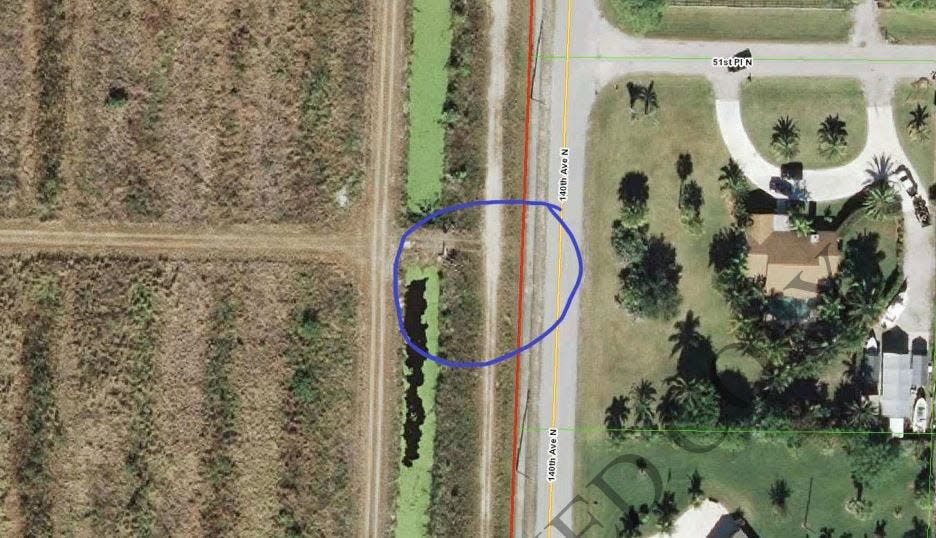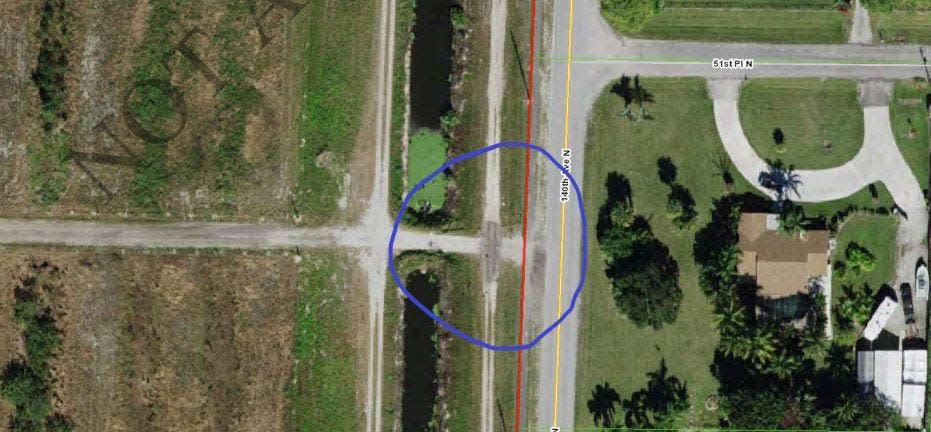Homebuilder Minto loses bid to use rural Palm Beach County road in building of Westlake
Agreements made decades ago when much of western Palm Beach County was swamp and orange groves could cost a prominent home builder $18 million after a judge ruled it couldn’t use a country road to connect to the burgeoning city of Westlake.
Minto Communities, the master developer and primary builder in Westlake, lost a partial judgment this month in a yearslong legal battle with the Indian Trail Improvement District about a right-of-way easement and a connector road between Minto’s property and district lands.
District officials complained the road, which didn't appear on satellite images until after Minto bought the land, was being used by construction vehicles building out Westlake, but they feared it would also eventually carry Westlake residential traffic.


The Oct. 16 ruling came about a week before Tuesday's landmark Palm Beach County Commission vote against a land-swap deal that would allow prolific builder GL Homes to develop parts of the protected Ag Reserve. Opponents argued the deal would set a precedent that would whittle away at Palm Beach County's preserved and rural land.
Although the Minto ruling was not connected to the GL Homes proposal, the attorney who represented Indian Trail said the Minto decision showed that development's encroachment into rural areas isn't a foregone conclusion.
“We’ve been there a long, long time and now it’s being developed, but there should still be room for rural people," said Indian Trail attorney J. Michael Burman. "Obviously this was a serious case for (Minto), but it was even more serious for us because it is our way of life."
Burman worked with his legal partners Bernard Lebedeker and Jeffrey Pepin on the protracted case, which was filed in June 2020. Palm Beach County Circuit Court Judge Richard Oftedal oversaw the proceedings and issued the partial judgment.
Disputed connector road crossed a walking path and horse trail
Oftedal wrote that despite the circuitous arguments in the case, it really concerned a disagreement over "a simple right-of-way."
The connection road that joined Minto property to Indian Trails allowed dump trucks and construction vehicles to trundle onto 140th Avenue North across a walking path and horse trail to access other mainline roads such as Persimmon Boulevard and State Road 7.
Cheaper choices: Palm Beach County developer offers smaller, cheaper homes after interest rates dent budgets
Burman said the ruling recognized the burden that increased traffic from construction vehicles and Westlake residents would have on neighborhoods in the district.
"Indian Trail is a local equestrian community. There are kids on horses. A lot of the roads are dirt," Burman said. "You can't just dump a project like this out there and expect us to maintain the roads."
Minto Communities President Mike Belmont downplayed the partial summary judgement that cut off access to 140th Avenue North, saying that while the company is disappointed in the initial ruling, it will not affect the “ongoing development or success of Westlake.”
Minto Communities acquired the land in western Palm Beach County in 2013, according to the lawsuit.
Want to get The Dirt?
Stay up to date on South Florida's sizzling real estate market and sign up for The Dirt weekly newsletter, delivered every Tuesday! Exclusively for Palm Beach Post subscribers.
“In fact, we anticipate Westlake will continue forward as one of the top-selling master planned communities in the United States,” Belmont said. "Interest in our commercial development activities remains very strong and we will continue the development of over 2 million square feet of retail, lifestyle and nonresidential projects.”
Westlake became the county's 39th city when it incorporated in 2016 on about 4,000 acres north of Lion Country Safari and west of The Acreage. The Acreage largely falls within the Indian Trail Improvement District.
As of mid-summer, nearly half of the 4,500 planned units in Westlake had been built and sold. Prices range from about $436,000 for the two-bedroom Cassia model home to the six-bedroom Coral Cove Grand, which at 4,500 square feet starts at $959,990.
Westlake is mostly in the Seminole Improvement District, which neighbors Indian Trail and is also a plaintiff in the lawsuit.
Minto and the Seminole Improvement District went to court after people in Indian Trail noticed vehicles crossing onto 140th Avenue North from the new connector road.
“That thing was a little dirt path, and they started using it for dump trucks and construction,” Burman said.
According to the lawsuit, Minto is required under its agreement with Palm Beach County to build two east-west roads to connect to 140th Avenue North. If it doesn’t, the builder says it must pay $18 million to the county for transportation impacts.
Minto argued it had a right-of-way easement to the road based on a series of conveyances made throughout the 1960s as the land passed through multiple owners and began to transform from agricultural and wetlands to residential lots.
But Oftedal said in his ruling that Minto’s access would “overburden the easement,” which was written when the land was a citrus farm not a “large-scale development, which will include thousands of single-family residences, various recreational activities, large commercial spaces, academic institutions, a tax collector’s office and fire station, as well as a multi-acre park, among many other uses.”
New suburbia carved out of exurbia: How Westlake, Palm Beach's most unusual suburb, has grown
Both Minto and Indian Trail accused each other of trying to shirk responsibilities in paying for road maintenance. Minto said Indian Trail wants to increase its coffers by charging it to use the roads, while Indian Trail said its 50,000 residents shouldn’t pay for roads to “support Minto’s empire.” Oftedal wrote in his order that Indian Trail can charge Minto a "reasonable fee" to use the right-of-way.
Burman said while the Oct. 16 ruling was only a partial judgment, Oftedal addressed every issue in the case, and that Indian Trail will ask for a final ruling.
“Everyone wants to build in western Palm Beach County, and that includes GL Homes, Avenir, Minto,” Burman said. “But nobody has paid attention to what the infrastructure should be or what is required.”
Kimberly Miller is a veteran journalist for The Palm Beach Post, part of the USA Today Network of Florida. She covers real estate and how growth affects South Florida's environment. Subscribe to The Dirt for a weekly real estate roundup. If you have news tips, please send them to kmiller@pbpost.com. Help support our local journalism, subscribe today.
This article originally appeared on Palm Beach Post: Minto loses access to western county road in limit on development

